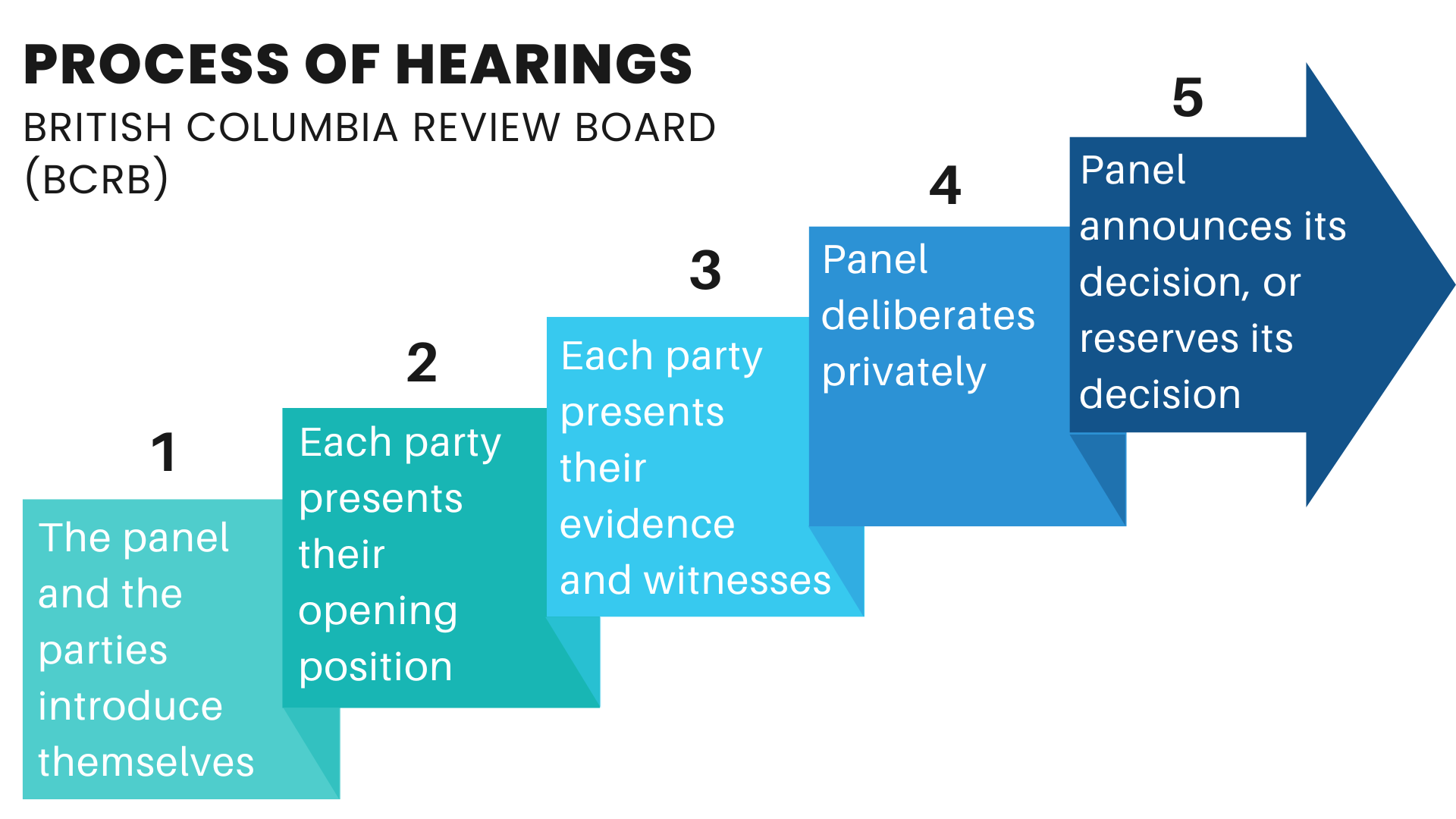
Learn about the role of the British Columbia Review Board and how it impacts the lives of people with mental health issues who are accused of a crime

In striking a balance between public safety and the rehabilitation of criminally accused who have a mental illness, the role of the British Columbia Review Board is crucial. Learning about the Board’s powers and responsibilities is a case in point of how justice and care intersect under Canada’s justice system.
This article is for current and aspiring lawyers who want to know more about the British Columbia Review Board. This is also for Canadians whose loved ones are subject to the Board’s interventions.
The British Columbia Review Board (BCRB) is an independent body or tribunal established by the federal Criminal Code. The BCRB has the power to hear cases and to make or review orders when an accused in a criminal case:
The BCRB will then decide whether to discharge the accused, or to hold the accused in custody. Its decision is based on the legal standards it follows, as laid down by the Criminal Code and common law. Its findings must also be supported by evidence presented during the hearing it conducts.
As a glimpse of how the BCRB works, this news video will show you its review process as applied on an actual case:
If you feel called to defend those who are accused of crimes and have mental health issues, law school is the first step. Go over our list of Canadian law schools for admission requirements, tuition rates, and more.
In 1992, provisions of the Criminal Code required every province and territory in Canada to have their own review board. These provisions of the Code also outlined:
Review boards are also guided by the 1999 decision of the Supreme Court in Winko v. British Columbia (Forensic Psychiatric Institute), [1999] 2 S.C.R. 625. This decision helps the review boards in their decision-making processes, especially in the interpretation of the Criminal Code’s provisions.
When a person has committed a crime, they will be tried and heard before a criminal court, with the government’s prosecution on the other side.
When this person (now called the accused) is experiencing a mental health illness, court proceedings will be different. Although this does not mean that the accused is not necessarily exempted from criminal liability.
This is so because a person with a mental illness is not held to the same standards as that of a sane person. The Winko case held that “[n]o person should be convicted of a crime if he or she was legally insane at the time of the offence.”
This is also related to s. 16 of the Criminal Code, which states that a person cannot be held criminally responsible when a crime is committed while they’re suffering from a mental disorder. As a qualification, this mental disorder must have rendered the person “incapable of appreciating the nature and quality of the act or omission or of knowing that it was wrong.”
The Winko decision also says that a verdict of “not criminally responsible” is neither a verdict of guilt nor a verdict of acquittal. Here’s where the review board, such as the British Columbia Review Board, enters the picture. The accused will be directed to the review board, which will assess their case and render the appropriate disposition.
The Criminal Code provides that each review board must be composed of at least five members appointed by the provincial Lieutenant Governor in Council. The review board's chairperson must either be a judge, qualified to be one, or have already retired. The current chair, Brenda Lee Edwards, is a senior lawyer and retired justice of the B.C. Provincial Court.
Among the members of the Board, one should be qualified to practice psychiatry. Other members can be from different relevant backgrounds, such as:
The British Columbia Review Board has these main functions:
Another provincial institution related to mental health is the BC Mental Health Review Board (BCMHRB). The BCRB and the BCMHRB have distinct roles and different jurisdictions when it comes to the mental health of a person:

The hearings of the British Columbia Review Board are held by a panel of three board members. The parties during the hearings are:
Hearings by the BCRB are not adversarial in nature. As held in the Winko case, the review board goes over all evidence on the relevant issues from both sides. As such, the BCRB must seek out evidence that favours the absolute or conditional release of the accused, and those that favour the restriction of the accused.
Ultimately, it is up to the BCRB to determine if the accused poses a significant threat to public safety or not. This is like criminal cases where the prosecution must prove the accused's guilt in committing the crime.
Here’s a summary of how the BCRB hearings usually work:

In deciding the criminally accused’s case, the BCRB’s main consideration is public safety. Aside from this, it also considers:
The disposition by the BCRB may be categorized into three:
This video shows an overview of how the BC Forensic Psychiatric Hospital works:
It’s best to talk to a criminal lawyer to know more about how the BC Review Board and the BC Forensic Psychiatric Hospital. Check out our Special Report on the Top Criminal Law Firms in Canada if you’re looking for criminal lawyers to consult.
When an accused is discharged conditionally, here are examples of the conditions that the BCRB may be imposed upon them:
This also depends on whether the accused is judged to be NCRMD or UST.
A requirement before an accused is turned to the BCRB is the criminal court’s determination that the accused is NCRMD or UST. Under the Criminal Code, there are differences between the two, whose dispositions to be made by the BCRB also depends.
A verdict of NCRMD is a final verdict; it’s done after a full trial on the charges was conducted. If the accused is deemed fit to stand trial, they may present the defence of “mental disorder defence – NCRMD.” After trial, if the court determines that the accused did not commit the crime, they’re acquitted. Otherwise, a psychiatric examination will be done, and the court will determine if the accused is either guilty, not guilty, or NCRMD.
On the other hand, a verdict of UST can be made at any time during the trial, but before judgment is reached by the court. A question regarding the accused’s mental health is raised either before or during the accused’s appearance before the court. A psychiatric assessment will then be ordered by the court.
A verdict of NCRMD means that the accused has committed the alleged criminal acts beyond reasonable doubt. However, they are not legally or morally responsible for those acts because of their mental disorder. Here, the court has already proven the criminal act, but there was no criminal intent because of the accused’s mental disorder.
In contrast, a verdict of UST means that the accused cannot conduct their defense during trial due to their mental disorder. In this case, the accused does not understand the nature and object of the proceedings, or its possible consequences, or cannot communicate with their counsel. As such, it would be unfair for the court to continue the trial, which is why the accused is given a verdict of UST.
A verdict of NCRMD will direct the accused to the BCRB’s hearing process to determine if the accused is a significant threat to public safety. Here are the three possible dispositions that the BCRB can order for an NCRMD, depending on whether the accused is a threat or not:
A UST verdict will trigger the BCRB’s specialized, periodic, and independent review of the accused. There are only two possible scenarios under a UST verdict:
A verdict of UST cannot be absolutely discharged by the BCRB, unlike in a verdict of NCRMD. If the prosecution does not produce enough initial evidence (prima facie case) against an accused who is UST, the accused must be acquitted.
While the British Columbia Review Board’s process differs from that of a court proceeding, the accused who appears before it is still secured with their basic legal rights such as:
The accused can file an appeal with the BC Court of Appeal within 15 days from when disposition was received. The appeal can be a question of law, fact, or both, and can be allowed under any of the following cases:
Common law provides that courts should, as much as possible, defer in reviewing and interfering with the BCRB’s decisions, unless its decision is clearly unreasonable. This judicial deference also requires the BCRB to conduct its duties diligently, and according to the standards set by the Criminal Code and other laws.
The British Columbia Review Board has a huge role in levelling the need to ensure public safety against criminals, and the rights of the accused with mental health challenges. The review board ensures justice is served for crimes committed while helping those in need, regardless of their criminal records.
More resources on how the legal profession works, aside from what the British Columbia Review Board is, can be found in our legal education and law schools page.